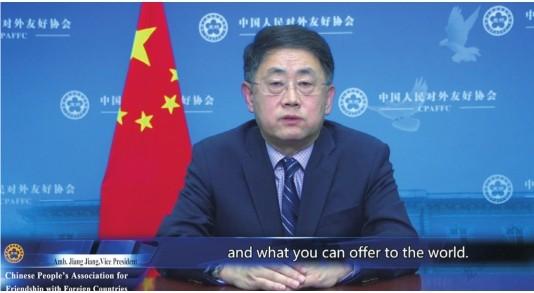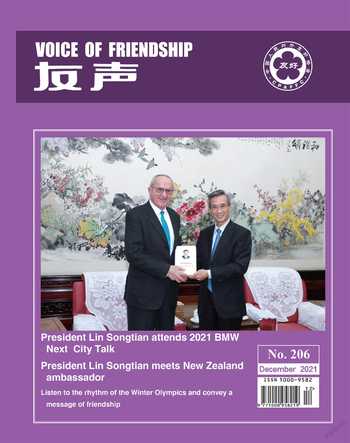Civilizations coexist in harmony
2021-01-22JiangJiang
Jiang Jiang
D ear young friends,
I truly appreciate this opportunity to connect virtually with you and the scholars present online at this China-Cyprus Youth Forum and exchange views with you on the topic of civilization.
To explore such a big topic, it might be useful to start by asking ourselves three big questions — a quintessential method in Western philosophy:
First question: What is civilization?
The definition of civilization, as one would expect, varies from culture to culture and from language to language. In the Chinese context, the word for civilization first appeared in I Ching, or the Book of Changes, which says “with dragon appearing in the field, civilization is born under heaven.” It defines civilization as a new era in people’s cultural and social advancement. In the Western context, the word“civilization” derived from the Latin word “civis”, which means“citizen” — that is, people who live in cities.
Undoubtedly, over the long course of history, with progress of human society, the meaning of civilization has kept expanding. The concept of civilization that we talk about today has become all-encompassing, providing a fertile ground for dialogue among civilizations.
Second question: When and where did civilization begin?
Again, the answers vary. Some believe that civilization began with humans learning how to make fire by drilling wood. Some others argue it was when written language was first invented. Still others say civilization began when the first hunting tool was flung over the African savannah.
All these suggestions show that civilizations, since their inception, have never been homogeneous. Over the long course of human history, people of different regions, races and languages have cultivated distinctive civilizatio ns reflective of their unique ways of production, living conditions and social customs.
Third question: Where is civilization headed?

Opinions on this question also vary. Some are particularly focused on wars and conflicts that broke out in different periods of history. They believe in the theory of the Thucydides trap and the inevitability of a clash of civilizations. But others have chosen to see the bigger trend of history and come to the conclusion that civilizations can embark on a path of harmonious coexistence and shared progress.
Dear young friends, the future of civilizations has a pivotal bearing on the future of humanity. What should we pursue in a world of diverse civilizations? What kind of relationship do we want between different civilizations? These questions call for some serious thinking. Personally, I consider three things to be vitally important.
First, it is important to have confidence in one’s own civilization and to preserve the uniqueness of each civilization. There are more than 200 countries and regions and over 2,500 ethnic groups in the world. Each civilization contains the collective memory of a country and nation. Each civilization is shaped by unique natural geography, traditions, national conditions and ways of life and work. Each civilization represents its people’s unique aspirations for a better life. And all civilizations have unique values and deserve full respect. We must love and preserve our own civilizations. And we need to keep progressing with the times, and be innovative in letting our civilizations thrive and keeping them forever young.
Second, it is important to uphold equality and respect cultural diversity. Diversity is the inherent nature of civilizations and the defining characteristic of human society. Between 800 and 200 BC, a period referred to as the Axial Age, great thinkers in both East and West such as Confucius, Mencius, Sakyamuni, Socrates, Plato and Archimedes laid the foundational course for their civilizations. And together, they presented an extraordinary landscape of human civilizations flourishing together. Civilizations are diverse and they are all equal. No region or country should characterize a particular civilization as superior to others or rank civilizations in a hierarchical order. No one should perceive their own civilization as representing absolute truths or universal values, or even the only ultimate future for all civilizations.
Third, it is important to learn from each other and advocate cultural inclusiveness. A well-known Chinese philosopher once said, different colors bring out the best in each other and the ensemble of music notes makes a song of harmony. From the 15th century to the 18th century, there was a great encounter between Chinese and Western civilizations. Western natural science, linguistics, literature and art were introduced to China during the Ming and Qing dynasties. Euclid’s Elements helped improve the Chinese calendar. Western orchestra was invited to perform in the Chinese court and a new school of painting was developed by blending Chinese and western painting methods. During the same period, people across Europe were fascinated by Chinese culture. It was considered a fashion among the upper class to drink Chinese tea and collect Chinese porcelain. European scholars began studying the Chinese culture. Montesquieu’s work, The Spirit of Laws, was influenced by Neo-Confucianism in ancient China. Today, in a globalized world, it is all the more important to learn to discover the beauty in each civilization while benefiting from the complementarities between civilizations.
Dear young friends, as we travel through the enormous span of humanity’s journey, consider yourselves lucky to live in an era in which all countries and things are connected and interact with one another through smart technologies. The world is just one click away, and friends are never far away thanks to technology. For today’s young generation, globalization and technology make life smarter and more convenient but, more important, they give you the ability and tools to be open-minded and accommodative in how you perceive the world.
I genuinely hope that you will cherish what this age has to offer and what you can offer to the world. It is crucial that the young people of today develop a sound outlook on civilizations, study your own civilization as well as those of others, embrace both the commonality and diversity of civilizations. I hope you will inherit and advance your own civilizations while at the same time be a contributor and advocate of exchanges and mutual learning between different civilizations, so that there will be less prejudice and more mutual respect in our world. All in all, we should work together toward a future of harmonious coexistence, rather than a clash of civilizations.
杂志排行
Voice Of Friendship的其它文章
- The Seagulls of Salt Lake City:Helen Foster Snow and China
- Overseas students from Peking University visit Xinjiang
- Listen to the rhythm of the Winter Olympics and convey a message of friendship
- A review of exchanges between Baoji and ROK in 2021
- 2021 GD Youth Link:3rd Guangdong International Youth Sports Dialogue held in Guangzhou
- Pacific China Friendship Association members issue joint statement to the WHO opposing politicization and stigmatization in COVID-19 origin-tracing
